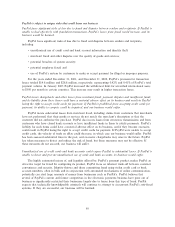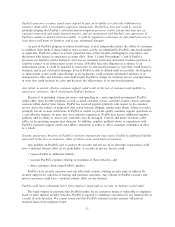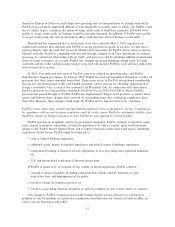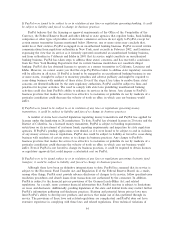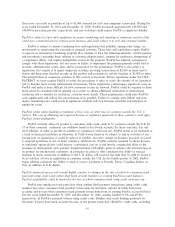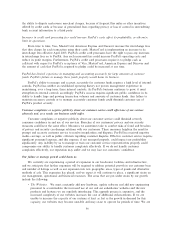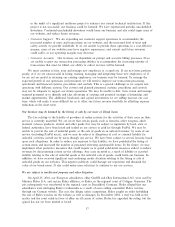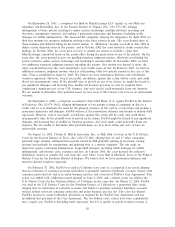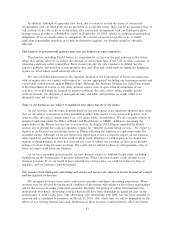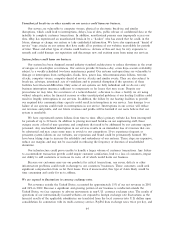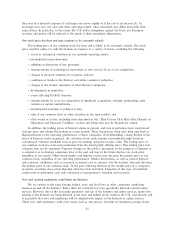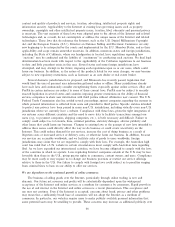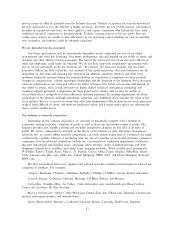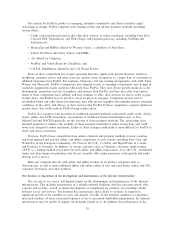eBay 2002 Annual Report Download - page 62
Download and view the complete annual report
Please find page 62 of the 2002 eBay annual report below. You can navigate through the pages in the report by either clicking on the pages listed below, or by using the keyword search tool below to find specific information within the annual report.Other than through these programs, we do not compensate users who believe they have been defrauded by
other users. We also periodically receive complaints from buyers as to the quality of the goods purchased.
Negative publicity generated as a result of fraudulent or deceptive conduct by users of our service could
damage our reputation and diminish the value of our brand name. We expect to continue to receive
communications from users requesting reimbursement or threatening or commencing legal action against
us if no reimbursement is made. Our liability for these sort of claims is only beginning to be clariÑed and
may be higher in some non-U.S. jurisdictions than it is in the U.S. This sort of litigation could be costly
for us, divert management attention, result in increased costs of doing business, lead to adverse judgments
or could otherwise harm our business. In addition, aÅected users will likely complain to regulatory agencies
who could take action against us, including imposing Ñnes or seeking injunctions.
Government inquiries may lead to charges or penalties.
On January 29, 1999, we received initial requests to produce certain records and information to the
federal government relating to an investigation of possible illegal transactions in connection with our
websites. We were informed that the inquiry includes an examination of our practices with respect to these
transactions. We have continued to provide further information in connection with this ongoing inquiry. In
order to protect the investigation, the court has ordered that no further public disclosures be made with
respect to the matter. Should this or any other investigation lead to civil or criminal charges against us, we
would likely be harmed by negative publicity, the cost of litigation, the diversion of management time and
other negative eÅects, even if we ultimately prevail. Our business would suÅer if we were not to prevail in
any action like this. Even the process of providing records and information can be expensive, time
consuming and result in the diversion of management attention.
PayPal completed its exit from the business of processing payments for online gambling merchants in
November 2002. Approximately 6% of PayPal's revenues in 2002 were derived from this business.
Beginning in July 2002, PayPal provided documents and information related to its services to online
gambling merchants in response to a federal grand jury subpoena issued at the request of the
U.S. Attorney for the Eastern District of Missouri. On March 28, 2003, PayPal received a letter from the
U.S. Attorney for the Eastern District of Missouri indicating its contention that PayPal's provision of
services to online gambling merchants violated 18 U.S.C. Û 1960 of the USA PATRIOT Act, which
prohibits the transmission of funds that are known to have been derived from a criminal oÅense or are
intended to be used to promote or support unlawful activity, thereby subjecting PayPal to potential civil
forfeiture of the amounts it received in connection with such activities as well as potential criminal
liability. The letter oÅered a complete settlement of all possible claims and charges from the
U.S. Attorney for the Eastern District of Missouri if PayPal paid the purported amount of its earnings
derived from online gambling merchants during the nine-month period from October 26, 2001 to July 31,
2002, plus interest. PayPal acted in the good faith belief that its conduct did not violate 18 U.S.C. Û 1960
and PayPal calculates that the amount of its earnings from online gaming activities was less than asserted
in the letter. Should this investigation lead to a civil or criminal charge against PayPal, we would be
harmed by negative publicity, the cost of litigation and the diversion of management time, even if PayPal
ultimately prevails. Any Ñnding of a civil or criminal violation by PayPal, or potentially any settlement,
could also endanger PayPal's ability to obtain, maintain or renew money transmitter licenses in
jurisdictions where it requires such licenses to operate, which would materially harm our business.
A large number of transactions occur on our websites. We believe that government regulators have
received a substantial number of consumer complaints about both eBay and PayPal, which, while small as
a percentage of our total transactions, are large in aggregate numbers. As a result, we have from time to
time been contacted by various foreign, federal, state and local regulatory agencies and been told that they
have questions with respect to the steps we take to protect our users from fraud and about our operations.
We are likely to receive additional inquiries from regulatory agencies in the future, which may lead to
action against us. We have responded to all inquiries from regulatory agencies by describing our current
and planned antifraud eÅorts, customer support procedures and operating procedures. If one or more of
60


